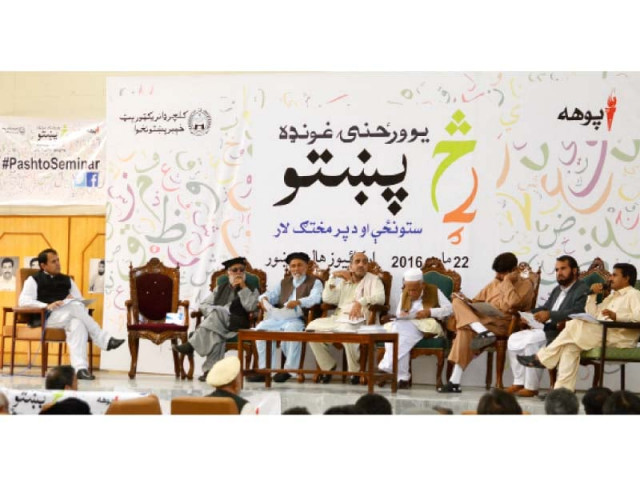Rooted in word: A mother tongue in need
The participants at panel discussions reminded the audience Pashto has historically never been “free”

Conference stresses importance of Pashto. PHOTO: EXPRESS
The problems and challenges faced by the Pashto language were discussed at a one-day conference at Shuhda-e-APS Memorial Library hall on Tuesday. Organised by the Poha Foundation, the panel discussions highlighted the lack of interest among Pukhtuns to study their language and the inability of academic institutions to promote Pashto.
A social problem
“Now even Pukhtuns abhor learning their own language,” said Dr Muhib Wazir, a poet. “It is a social problem that they do not love their own language,” agreed Faizul Wahab Faiz. The poet went so far as to argue the reason why Pukhtuns still speak their language was that they cannot learn other languages easily. If they could, he said, they would forget how to speak Pashto.
The participants at panel discussions reminded the audience Pashto has historically never been “free”, having been neglected under Mughal rule and later under British imperialism. But even in today’s Pakistan, the scholars regretted, the dominance of other languages does not allow Pashto to grow independently.
Compulsory
Well-known Pashto scholar Dr Israr argued Pashto should be made a compulsory language at both government and private schools, but panellists agreed many problems would have to be overcome to successfully teach the language. Pervez Mahjour Kheshgi in particular highlighted the lack of specialised teachers for Pashto in K-P schools. The panellists advised authorities to consult school teachers about the difficulties they face.
“To make this language a medium of education, we should first establish [its orthography],” said Kheshgi. Israr agreed and asked, “If we cannot even write in Pashto, how we will take the language forward?”
Both scholars agreed the many dialects of Pashto pose a challenge to its written form. Kheshgi regretted that people were not prepared to accept any dialect other than their own.
Published in The Express Tribune, March 23rd, 2016.













COMMENTS
Comments are moderated and generally will be posted if they are on-topic and not abusive.
For more information, please see our Comments FAQ